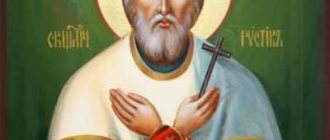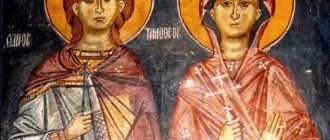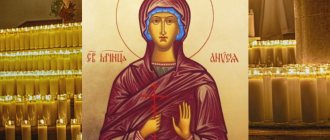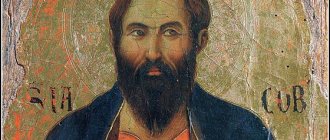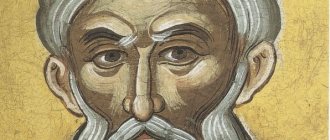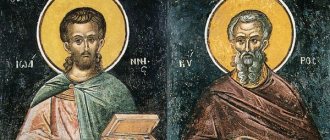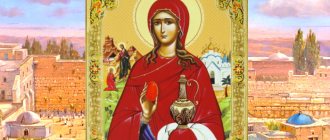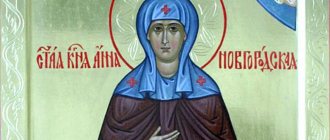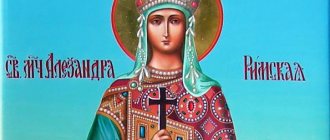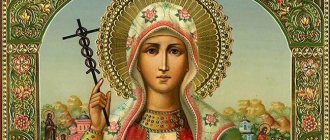Biography of Saint Emilia
At the dawn of Christianity, in the 4th century, in the lands that belonged to the Roman Empire, there lived a woman who gave birth to ten children, five of whom were canonized by the church after their death. Her name was Emilia of Caesarea. The saint was presumably born in 305 in the city of Neocaesarea.
The girl's parents owned a lot of land in Asia Minor. The father and mother of the righteous woman were adherents of Christian teaching, for which they paid with their lives. Left an orphan, the girl wanted to become a nun. However, the Lord had other plans for her. Many men of Neocaesarea were struck by Emilia's beauty. Some even planned to kidnap the girl from her home and forcefully marry her. The orphan had to agree to marry a rhetoric teacher, lawyer Vasily.
The girl's groom was the son and grandson of pious Christians who steadfastly defended their faith in Christ even during persecution. Emilia got married when Constantine the Great began to rule the Roman Empire. Under the new emperor, the persecution of Christians stopped. Emilia was a faithful wife to her husband and a like-minded person who shared his religious views. The woman gave birth to children, raised them in the spirit of Christianity, and from childhood taught each of her children to keep the commandments of God.
Christians remember Emilia, first of all, as the mother of Basil the Great, the pious shepherd of Caesarea in Cappadocia, who fought for the purity of the faith with the Arians. The Church canonized this son of the most holy woman, as well as her two other children - Gregory, Bishop of Nyssa, and Peter, Bishop of Sebaste. Emilia’s two daughters, the Venerable Macrina and the righteous Theozva, were also canonized. The rest of her children started families and lived to glorify the Lord.
Emilia and Vasily led a strange life for those times. They owned huge tracts of land in Cappadocia, Pontus and Lesser Armenia. However, they never visited theaters or horse races; on the contrary, they despised the idle life of their rich contemporaries. All members of the pious family prayed to the Savior and lived according to his teachings. Following the commandments of God, the couple engaged in charity work, gave shelter to the poor, and fed the hungry.
After the death of her husband, the righteous woman with her daughter Macrina and faithful servants moved to her family estate in Pontus, located near the Iris River. In this place, women founded a nunnery. Emilia and her daughter lived like nuns, prayed to God, wore modest clothes, and ate with the rest of the inhabitants of the monastery. Having lived 73 years, Emilia died. The righteous woman was buried in 375 in the family crypt near the church built in honor of 40 martyrs.
Naming
The life of Saint Dionysius and its meaning in Orthodoxy, icon and texts of prayers
Naming a name since the time of Adam naming the names of animals in paradise was considered a certain sacrament that granted power to the one who names over the one who is named; the name also revealed the essence of the named. So the Lord Himself calls the first man Adam, which means husband, man. After the Fall, Adam calls his wife Eve - life.
Upon the birth of her first son, Eve says: “I have acquired a man from the Lord” and calls him Cain, that is, created (the word Cain in Hebrew and Aramaic means “to create, to forge”).
From this day on, the wife usually retains the right to name her newborn child, because it was she who nurtured him within herself and, having endured birth pangs, brought him into the world. That is, it is the mother who has the most rights over her child, and it is she who feels and knows the essence of him, for for almost a year she lived the same life with him.
Although, as can be seen from Scripture and the Lives of the Saints, there have been cases when the father names the newborn, and even when the Lord Himself tells the parents what to name the baby.
Son's naming: Zechariah and Elizabeth
The holy righteous Zechariah and Elizabeth did not have children for a long time. One day, when Zechariah, as a priest, was in the Holy of Holies, an angel of God appeared to him and said that his wife would soon conceive and they would have a son, whom they would name John, “and there would be joy and gladness, and many would rejoice at his birth.” " But Zechariah did not believe the angel of God, and for this he was punished with muteness until the time of his wife’s permission.
When the time came for Elizabeth to give birth, and she gave birth to a son, she was asked what she would name her child. And she, as if feeling the Will of God with her maternal heart, said: John:
The time came for Elizabeth to give birth, and she gave birth to a son. And her neighbors and relatives heard that the Lord had magnified His mercy over her, and they rejoiced with her. On the eighth day they came to circumcise the baby and wanted to name him, after his father’s name, Zechariah. To this his mother said: no, but call him John. And they said to her: There is no one in your family who is called by this name. And they asked his father by signs what he would like to call him. He demanded a tablet and wrote: John is his name. And everyone was surprised. And immediately his mouth and his tongue were loosened, and he began to speak, blessing God (Luke 1).
Veneration of Saint Emilia in Orthodoxy
The woman who gave the world five Christians canonized as saints is remembered and honored in the Orthodox Church. The Day of Remembrance of Righteous Emilia is celebrated annually on January 14. Saint Gregory of Nazianza was amazed at this woman who managed to raise so many worthy Christians. Orthodox believers venerate the saint, pray in front of her most holy icon and ask for forgiveness of sins and intercession.
LIFE
Emilia of Caesarea (Cappadocia) was born in Caesarea between 305 and 315 into a wealthy family that owned extensive possessions in Asia Minor.
In her youth, Emilia was distinguished by rare beauty, but, being a deeply religious person, she prepared herself for celibacy. However, she was orphaned early, her father suffered martyrdom under the Emperor Licinius. At that time, it was very common for single girls to be kidnapped for forced marriage. Fearing this, Emilia married lawyer Vasily, who later became a priest. Vasily was known as an educated and pious man.
Saint Gregory the Theologian writes that their marriage consisted not so much in a carnal union, but in a mutual desire for virtue. They took care of the poor, welcomed strangers, and spent a significant part of their property on charity. The Lord blessed Emilia with many children; she had 10 children.
She is revered as the mother who raised five saints - Basil the Great, Bishop of Caesarea in Cappadocia, Gregory, Bishop of Nyssa, Peter, Bishop of Sebaste, Venerable Macrina the Younger and Blessed Theosevia.
Emilia's son Naucratius left his secular career at the age of 22, retired to the desert and lived in solitude for 5 years, after which he was honored with a blessed death. Another son, Nikifor, died at an early age. The names of Emilia's other children are unknown. It is believed that some of them subsequently became monks.
After the death of her father, the eldest daughter Macrina helped Emilia run the household; when the children grew up, she convinced their mother to turn to the monastic lifestyle. Together they retired to a remote estate on the banks of the Iris River, in modern Turkey, and founded a monastery there. Some of the slaves they freed wanted to renounce the world with them and go to a monastery, and they had everything in common: one cell, one table, the same clothes; they had everything necessary for life equally; They served the Lord with one accord, in humility, meekness and love, and they had no anger, no envy, no hatred, no contempt, nothing that was not pleasing to God. They had one constant task - thinking about God and prayer, and they considered care and work for the needs of the body to be unimportant tasks, and not the work itself.
Having lived to an advanced age, Emilia approached death. Having learned that she was on her deathbed, her youngest son Peter came to her monastery and, together with Saint Macrina, began to care for his mother during her illness. During the very separation from the body, Macrina and Peter sat on both sides of the dying woman’s bedside and called the other brothers and sisters by name, and she, like a treasure, left her maternal blessing to everyone. Then, placing one hand on Macrina and the other on Peter, she said, turning to the Lord:
- To you, Lord, I give the firstfruits and the tithe of the fruits of my womb: the firstfruits is this firstborn daughter, the tithe is this last son! In the Old Testament You commanded to bring You the firstfruits and tithes of fruits: may they be an acceptable sacrifice to You and may Your holiness descend upon them!
With these words she died. She was then 73 years old.
← Martyr Basil of Ancyra, Caesarea Saint Athanasius (Volkhovsky), Poltava, miracle worker, bishop →
Iconography
Icon painters immortalized the image of Emilia by depicting her on church icons. During her lifetime, the righteous woman gained the love and respect of her compatriots. This woman was revered as the mother of five Christians who dedicated their lives to serving the Lord God. After her death, she was canonized and began to be painted on icons.
Emilia is depicted alone or surrounded by her five pious children. The righteous woman is depicted wearing a chiton with a blue maforium on her head. The adult sons and daughters of this holy woman are depicted in monastic or episcopal clothing. The righteous woman holds a scroll with Christ’s commandments in one hand, and blesses Christians with the other. Some icons depict a saint with a cross in her hand.
The most holy image of the righteous woman and her son Basil the Great can be seen in the Church of the Three Hierarchs, located at the school of the Greek-Latin office of Shchichalin. There is an icon of the saint in Golenishchevo, in the Church of the Life-Giving Trinity.
Profession and business
Emilia has excellent logical analysis skills and developed intuition. Therefore, the professions of a police officer, tax service, and customs may be ideal for her. She makes a wonderful medical worker or diplomat. She is a responsible specialist and masters the techniques of oratory. An innate sense of beauty and a personal creative approach to business allow her to also express herself as a designer, fashion designer, and stylist.
A woman with this name can be successful in business; luck is often on her side. But you can’t earn big money due to excessive generosity.
Suitable professions
Thanks to the qualities of his character, he can become successful:
- police officers;
- tax officer;
- lawyer;
- designer;
- stylist;
- musician.
Prayer text
Modern parents pray to the most holy woman, who gave the world five Christian children who have been canonized as saints, for help in raising their sons and daughters. Mothers who have serious problems with their children turn to the righteous woman. Emilia helps every woman raise a child in accordance with the commandments of God.
Believers ask the righteous woman to pray to the Lord God for the salvation of their souls. Christians turn to the saint with prayers when there is trouble in the family or one of the relatives is sick. Women named Emilia consider the righteous woman their patroness.
First prayer
Pleased of God, Emilia, remember in your favorable prayers before Christ God, may He save us from temptations, illnesses and sorrows, may He grant us humility, love, reasoning and meekness, and may He vouchsafe us, unworthy, His Kingdom. Amen.
Characteristics of the name by letter
E – oratorical skills, the ability to persuade, the ability to quickly and easily achieve a goal. The owner of a name with this letter is inquisitive and has aesthetic taste. This is a bright, charming person. Endowed with cunning and resourcefulness. Knows how to love passionately. He is looking for a partner who can support his aspirations. In marriage, he remains faithful to his life partner. The letter “E” at the beginning of a name endows its bearer with sophistication, sociability, and the ability to see through people.
M – inner strength, ability to solve complex problems, curiosity and the desire to try everything from one’s own experience. The bearer of a name with this letter loves to plan the future. This is a sympathetic, caring person. Able to take into account other people's interests. In love, he is ready to sacrifice himself.
And - rich imagination, insight, lively mind, practicality, attention to detail. The bearer of a name with this letter strives for harmony with himself and the world around him. He has a good sense of humor, is endowed with sensitivity, kindness and gentleness. This is an honest and straightforward person. He is romantic in love and searches for his ideal for a long time. The repetition of a letter in a name indicates a person’s giftedness and inner need for spirituality.
L – aesthetic view of things, creative abilities. Such a person is interesting in communication, knows how to win over, give in and adapt to other people. Loves surprises and unusual situations. Knows how to love, remains faithful to the chosen one. Wants to share knowledge, emotions and sensations with his other half. Strongly attached to family.
Start of a family
Where does childbearing begin? First of all, from the birth of the family - the union between a man and a woman.
Starting a Family: Adam and Eve
The first family appeared in paradise.
And God created man in His own image, in the image of God He created him; male and female he created them. And God blessed them, and God said to them: Be fruitful and multiply, and fill the earth and subdue it, and have dominion over the fish of the sea and over the birds of the air and over every living thing that moves on the earth (Gen. 1:27-28).
| Creation of the first woman |
The first woman was created after the creation of man to become his corresponding helper. She was created from a rib, and was flesh of the flesh of her husband, Adam. Adam himself, seeing the woman, calls her wife. Husband and wife cleave to each other and become one flesh:
And the Lord God said: It is not good for man to be alone; Let us create for him a helper suitable for him…. And the Lord God caused the man to fall into a deep sleep; and when he fell asleep, he took one of his ribs and covered that place with flesh. And the Lord God created a wife from a rib taken from a man, and brought her to the man. And the man said, Behold, this is bone of my bones, and flesh of my flesh; she will be called woman, for she was taken from man. Therefore a man will leave his father and mother and cleave to his wife; and they will be one flesh. And they were both naked, Adam and his wife, and were not ashamed (Gen. 2).
A husband and wife are not ashamed of each other if the basis of their relationship is chastity.
After the Fall, human nature changes, subordination appears in the family. Now the husband is the head of the couple, master of his wife. From now on, the basis of the husband’s salvation is labor - to cultivate the land and take care of his family. For the wife, the means of salvation and purification of the soul is assigned to another work - the sorrow of the flesh during pregnancy and childbirth.
He said to his wife: I will multiply your sorrow in your pregnancy; in illness you will give birth to children; and your desire will be for your husband, and he will rule over you (Gen. 3:16).
Having heard such words of the Lord, Adam understands that from now on a great power is hidden in a woman, which comes to her through pain and labor - to give life to another person, therefore he calls her by the name Eve, which means life.
And Adam called his wife’s name Eve, for she became the mother of all living (Gen. 3:20).
After the birth of her first child, Eve herself realizes that her child is a gift from God:
Adam knew Eve his wife; and she conceived and gave birth... and said, “I have acquired a man from the Lord” (Gen. 4:1).
Adam and Eve lived together in repentance and labor for more than nine hundred years and gave birth to sons and daughters. And from them came the entire human race.
The beginning of a family: The first wedding night. Tobiah and Sarah
The entire family structure depends on the relationship of the spouses to each other. The Lord favors a marriage sanctified by chastity.
The Old Testament heroine Sarah married seven times, but each time on her wedding night, before the spouses knew each other, a demon took the soul of her new husband. Sarah herself lamented the evil fate in her fate and despaired of creating a good union.
Seeing her pure heart, the Lord arranges her path. Tobiah, the son of Tobit, taught by the Angel of God, decides to marry Sarah. Tobias trusts in God’s help and His mercy and, left alone with his young wife, he and she turn to God with prayer:
When they were left alone in the room, Tobiah got out of bed and said: Get up, sister, and let us pray that the Lord will have mercy on us. And Tobias began to say: Blessed are You, God of our fathers, and blessed is Your holy and glorious name forever! May the heavens and all Your creations bless You! You created Adam and gave him Eve as his helper, his support wife. From them came the human race. You said: it is not good for man to be alone; let us create a helper like him. And now, Lord, I take this sister of mine not to satisfy lust, but truly as a wife: deign to have mercy on me, and let me grow old with her! And she said to him: Amen (Tobit, ch. 
Sarah becomes Tobiah's faithful wife, and the demon leaves her. Some theologians believe that the demon killing her spouses was a demon of lust, for Sarah was beautiful. The joint prayer of Tobias and Sarah on their wedding night helped them overcome the demon and become a real family, where the wife is not only the object of her husband’s desire, but his helper and co-worker on the path to the Lord. And the Lord Himself blesses their union.
